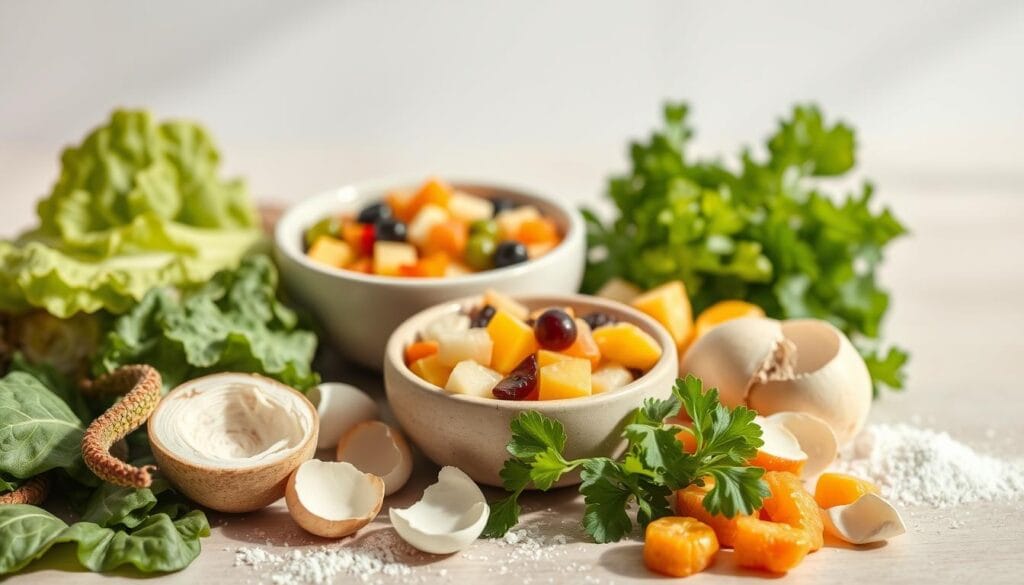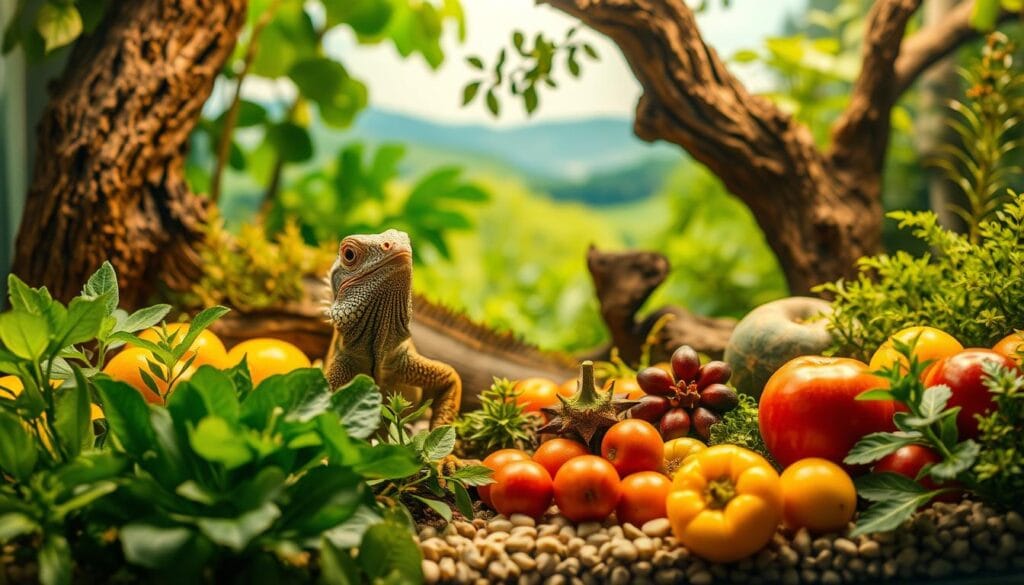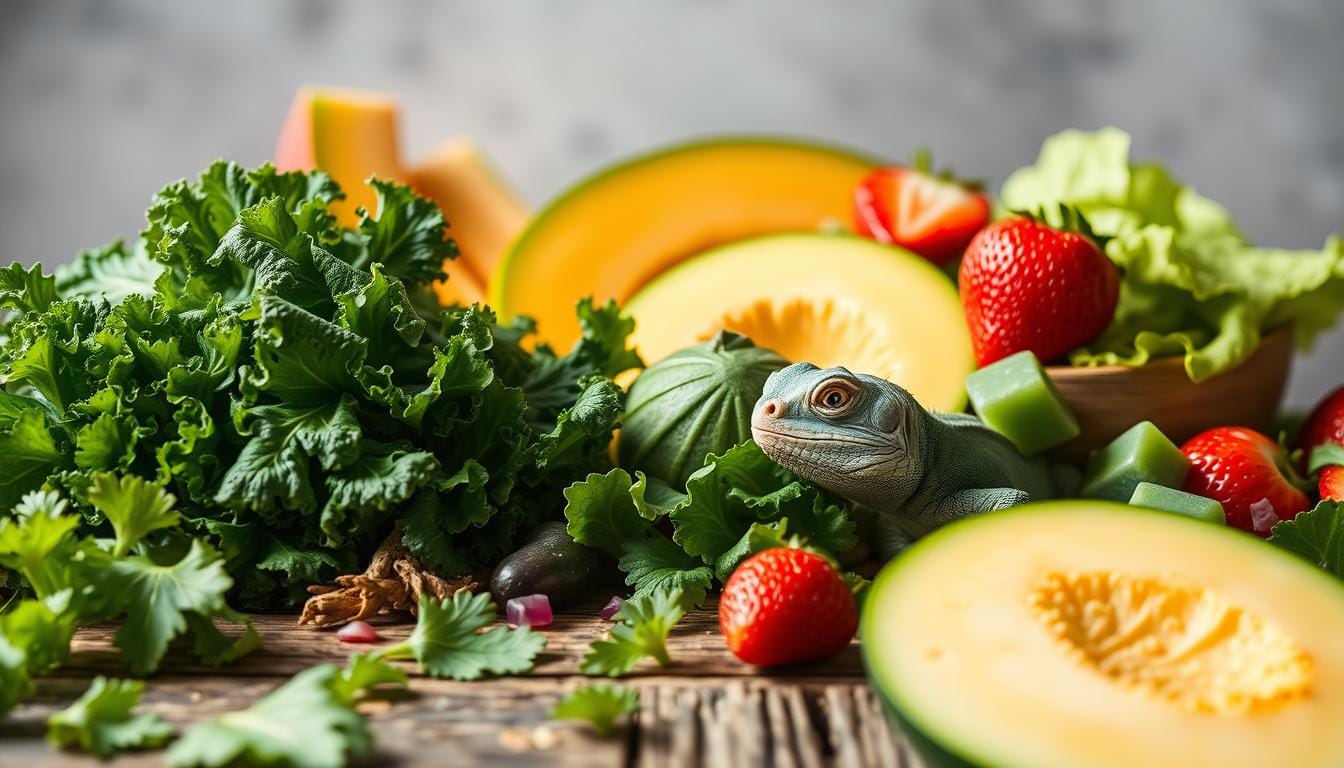Caring for a green iguana means knowing their special diet needs. These amazing reptiles mostly eat plants, with about 90% of their diet being plant-based in the wild. Giving them the right food is key to their health and long life.
It’s important for pet owners to understand their iguana’s diet needs. Green iguanas do best on a diet full of leafy greens, veggies, and a little fruit. They need a diet that’s just right to avoid health problems like bone disease and getting too fat.
Feeding your iguana right is more than just giving them food. It’s about picking the best foods, knowing how much to give, and making sure they get all the nutrients they need. Vets say to feed them like they do in the wild, with lots of dark greens and some special supplements.
Table of Contents
Understanding Iguana Dietary Needs
Green iguanas are fascinating herbivores with a unique digestive system. They are perfectly adapted to eat leafy plants. Knowing their dietary needs is key to keeping them healthy and long-lived.
Why Iguanas Are Herbivores
Iguanas have special adaptations for a plant-based diet. Their digestive system is longer and more complex than meat-eaters. They get about 80-90% of their nutrients from plants.
Nutritional Requirements
Calcium-rich greens are crucial for iguanas. They need certain nutrients to avoid metabolic bone disease, which affects many captive iguanas. A balanced diet should include:
- 60-70% calcium-rich leafy greens
- 20-30% other vegetables
- 10% or less fruit
The Importance of Hydration
Keeping your iguana hydrated is vital. Dehydration can harm about 10-15% of captive iguanas. Make sure they always have fresh water. You can also help by giving water-rich veggies and misting them occasionally.
Pro tip: Monitor your iguana’s water intake and ensure they have access to clean, fresh water at all times.
By understanding these dietary needs, you can help your iguana thrive. With great care, they can live up to 15-20 years.
Key Components of an Iguana Diet
Knowing the iguana diet essentials is key to keeping your reptile healthy. Green iguanas need a special diet that’s full of nutrients.
Your iguana’s diet should mix plant-based foods for the best nutrition. Focus on fiber and essential nutrients.
Leafy Greens: The Foundation of Their Diet
Leafy greens are the base of an iguana’s diet. Experts say 70-80% of their food should be dark, calcium-rich greens. Good choices include:
- Collard greens
- Mustard greens
- Dandelion greens
- Kale
Vegetables: Variety Is Crucial
Vegetables add important nutrients and variety to their diet. Try to mix different veggies to keep their diet interesting.
“Nutrition diversity is key to maintaining your iguana’s health and preventing nutrient deficiencies.”
Fruits: Should They Be Included?
Fruits should only make up a small part of their diet. Limit them to 10-20% to avoid too much sugar. Recommended fruits include:
- Berries
- Mango
- Papaya
When planning meals, remember to control portions and balance nutrients. This is crucial for their health and energy.
Foods to Avoid for Iguanas
Keeping your iguana healthy means knowing which foods are bad. Not all green foods are safe for them. Some protein sources can be very harmful.
Choosing the right food for your iguana is crucial. Some foods can hurt their digestive system and health.
Toxic Plants and Their Effects
Many houseplants are toxic to iguanas. These plants can cause serious health problems, including:
- Organ failure
- Digestive distress
- Neurological problems
High-Protein Foods: Risks Involved
Protein sources are very dangerous for iguanas. Their bodies can’t handle animal proteins well. This can lead to:
- Kidney damage
- Metabolic disorders
- Potential long-term health issues
| Protein Source | Potential Risk |
|---|---|
| Meat | Severe Kidney Damage |
| Dairy Products | Digestive Complications |
| Insects | Metabolic Imbalance |
Processed Foods and Allergies
Processed foods can cause allergies and upset your iguana’s diet. Stick to fresh, natural foods for their health.
Remember: Your iguana’s diet should mimic their natural herbivorous eating habits in the wild.
Creating a Balanced Meal Plan

Creating the right diet for your iguana is key. It needs a meal plan that fits its age, size, and the time of year. This ensures it stays healthy.
Feeding your iguana is more than just tossing greens in their cage. It’s about giving them the right food to keep them healthy and growing well.
Daily vs. Weekly Feeding Guidelines
Diet needs change as iguanas grow from young to old:
- Juvenile iguanas: Need twice-daily feedings
- Adult iguanas: Usually get one daily feeding
- Feeding should match their metabolic needs
Portion Sizes for Healthy Growth
Controlling how much food is key to avoid obesity and ensure they get what they need:
| Iguana Age | Portion Size | Feeding Recommendation |
|---|---|---|
| Juvenile | Head-sized portions | 2x daily |
| Adult | Body-sized portions (excluding tail) | 1x daily |
Seasonal Variations in Food Choices
Your iguana’s diet should change with the seasons. Food types and nutritional needs vary throughout the year. Adjust their diet by:
- Switching up seasonal veggies
- Keeping an eye on protein and calcium
- Changing portion sizes based on activity
“A balanced diet is the cornerstone of your iguana’s health and longevity.” – Reptile Nutrition Experts
Every iguana is different, so they might need special diets. Regular vet visits can help tailor their meal plan for the best health.
Supplements for Iguanas
Proper nutrition is key for your iguana’s health. Supplements are vital for their well-being. Green iguanas need special nutrients that their natural diet can’t always provide.
When Are Supplements Necessary?
Supplements are needed when your iguana’s diet might be lacking. Even calcium-rich greens can’t cover all nutritional bases. You should consider supplements if:
- Your iguana has limited access to fresh greens.
- They live in an indoor habitat with few food options.
- You notice signs of nutrient deficiencies.
- A reptile vet recommends them.
Types of Supplements to Consider
Not all supplements are right for iguanas. Here are the most important ones:
- Calcium powder: Essential for strong bones.
- Vitamin D3 supplements.
- Multivitamin formulas made for reptiles.
How to Properly Administer Supplements
Administering supplements correctly is crucial to avoid overdose. Dust your iguana’s food with calcium powder for even coverage. Use calcium supplements 3-4 times a week, as advised by a vet.
Pro tip: Always consult a reptile specialist to determine the precise supplement regimen for your specific iguana.
Preparing Iguana Meals: Tips and Tricks
It’s important to prepare your iguana’s meals right to keep them healthy. You need to pick, wash, and serve their food carefully.
There are a few steps to make sure your iguana eats well. These steps help keep the food good and safe for your pet.
Cutting and Serving Techniques
Here are some tips for cutting and serving your iguana’s food:
- Chop veggies into small pieces
- Cut greens into thin strips
- Take out tough stems
- Make food portions just right for your iguana
Proper Washing and Cleaning
Keeping food safe is key when you’re preparing meals for your iguana. Here’s how to wash food:
- Rinse all produce under cool water
- Scrub veggies to get rid of dirt and pesticides
- Pat dry with clean towels
- Check for any bad spots or damage
Food Safety Practices
Food safety is crucial to keep your iguana healthy. Here are some important practices:
| Practice | Purpose |
|---|---|
| Use fresh ingredients | Keep nutrients high |
| Avoid cross-contamination | Stop bacteria from growing |
| Store food right | Keep it fresh |
| Replace uneaten food fast | Stop bacteria growth |
*Pro Tip*: Always wash your hands before and after preparing your iguana’s meals to maintain optimal hygiene.
By using these tips, you’ll make sure your iguana gets healthy, safe meals. This will help them stay happy and healthy.
Signs of Dietary Issues in Iguanas
Keeping an eye on your iguana’s health means watching its diet and how it looks. If you ignore its specific needs, nutritional problems can pop up fast.
Recognizing Malnutrition Symptoms
Malnutrition in iguanas shows up in several important ways. Look out for these signs:
- Dramatic weight loss
- Lethargy or reduced activity levels
- Changes in stool consistency
- Weakened muscle tone
Your iguana’s hydration is super important. Low fiber intake can cause digestive problems. Iguanas have a long intestinal tract, so they need the right food to digest well.
Observing Behavioral Changes
Behavioral changes can hint at diet problems. Watch for these signs:
- Decreased appetite
- Unusual hiding behavior
- Reduced interaction
- Visible discomfort when moving
The Importance of Regular Health Checks
Regular vet visits are key to spotting diet issues early. They help keep your iguana’s body condition right. This ensures it stays hydrated and gets enough fiber.
Spotting diet problems early can greatly improve your iguana’s health and happiness.
Keep track of your iguana’s diet, notice small changes, and make sure it sees the vet regularly. These steps can prevent big health problems.
Transitioning to a New Diet

Changing your iguana’s diet needs patience and careful watching. It’s all about slowly adding new foods to keep your reptile healthy and happy.
Understanding your iguana’s nutritional needs is key. Sudden diet changes can upset their stomach and lead to health issues.
How to Introduce New Foods
Here’s how to add new foods to your iguana’s diet:
- Start with small amounts of new foods
- Mix new foods with foods they already like
- Introduce one new food at a time
- Wait 3-5 days before trying another new food
Monitoring Reactions to New Foods
Keep an eye out for these signs when changing your iguana’s diet:
- Changes in how much they eat
- Stomach problems
- Behavior changes
- Physical changes
Tips for Picky Eaters
Some iguanas can be picky. Creativity is key in getting them to try new foods:
- Chop foods into different sizes and shapes
- Try foods at different temperatures
- Experiment with how you present food
- Stay consistent and patient
Remember, changing your iguana’s diet takes time. Their health depends on a careful, slow approach to new foods.
Common Myths About Iguana Diets
Iguana owners often believe wrong things about their pets’ food needs. It’s important to know the truth to give your iguana the best care.
Not Everything Green is Safe
The idea that iguanas can eat any green food is very wrong. These reptiles are herbivores, but not all greens are good for them. Some plants are toxic or don’t give enough nutrients.
- Avoid toxic plants like rhubarb leaves
- Choose nutrient-dense leafy greens
- Research safe vegetable options
Fruits: A Limited Treat
Fruits are not a must for iguanas. They can be treats, but shouldn’t be the main food. Experts on exotic pets say to limit fruits because they have too much sugar.
“Moderation is key when offering fruits to your iguana.” – Reptile Nutrition Specialist
Protein Misconceptions
The biggest myth is that iguanas need meat for protein. But they are strict herbivores. Adding animal protein can harm their health and upset their stomach.
- Iguanas do not require meat protein
- Plant-based diets are optimal
- Excessive protein can damage kidney function
Knowing these myths helps you give your iguana a balanced and healthy diet. This supports their long-term health and energy.
Resources for Further Learning
Learning more about iguana care is exciting. You’ll find many resources and expert advice to help. This journey doesn’t stop with this article. You’ll need professional knowledge to care for your iguana well.
Vets at places like Scales and Tails Animal Hospital are experts in iguana diets. They offer detailed consultations on what your iguana needs to eat. Books like “The Green Iguana Manual” by James W. Hatfield III also offer great insights into nutrition and health.
Online groups like Reddit’s r/iguanas and Facebook reptile care groups are great for advice. They share real experiences and tips on feeding iguanas. But, always check advice with a vet to make sure it’s right.
For the best advice, always talk to a reptile vet. They can check your iguana’s diet and suggest supplements. They help keep your iguana healthy with the right food.

